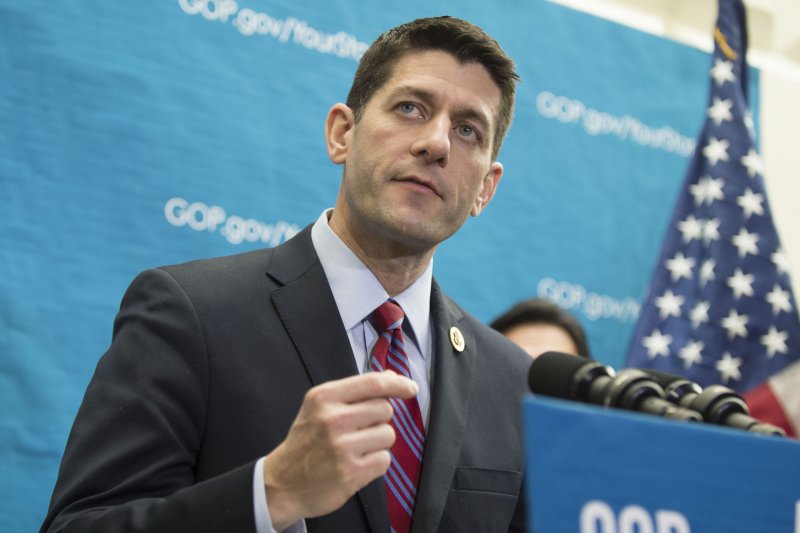House Budget Committee Chairman Paul Ryan (R-WI) speaks following a Republican conference meeting on Capitol Hill, December 10, 2013, in Washington, D.C. Ryan and Senate Budget Committee Chair Patty Murray (D-WA) have reached a tentative budget agreement to restore about $65 billion in automatic spending cuts. UPI/Kevin Dietsch |
License Photo
WASHINGTON, Dec. 16 (UPI) -- A bipartisan budget compromise awaiting a U.S. Senate vote after winning House passage is a key step but not an end to gridlock, the accord's deal-makers said.
"I think it's a step forward that shows that there can be other breakthroughs and compromise if you take the time to know somebody, know what their passions are, and know how you can work together," Senate Budget Committee Chairwoman Patty Murray, D- Wash., told NBC's "Meet the Press."
"We can't take on the tough discussions unless we can learn to use the word 'compromise,'" she said.
House Budget Committee Chairman Paul Ryan, R-Wis., appearing with Murray said, "You gotta, you know, crawl before you can walk before you can run."
He explained he and Murray "wanted to try to make this divided government work, at least at a minimum, basic functioning level."
The budget agreement that awaits Senate action passed the House 332-94 Thursday, with 169 Republican and 163 Democratic votes but faces a tighter Senate vote, aides say.
The measure, which ends the threat of a government shutdown in January and October, calls for $62 billion in new domestic and military spending in the current and next fiscal years above current sequestration caps. It also phases in revenue hikes and spending offsets that lawmakers promise will lead to a net $23 billion deficit reduction over a decade.
But Murray and Ryan both said the budget deal -- which by all accounts is modest, despite creating a truce in spending battles that paralyzed Congress for nearly three years -- would not likely be followed by other comprehensive deals or grand compromises.
"I think the grand bargain, you know, puts everything in a whole lot of tough votes on the table is impossible to find at this point," Murray said.
Ryan said in a separate, pretaped interview without Murray on "Fox News Sunday" Republicans would demand additional concessions of Democrats in talks in the next couple of months to raise the federal debt limit.
"We as a caucus, along with our Senate counterparts, are going to meet and discuss what it is we want to get out of the debt limit," he said. "We don't want nothing out of this debt limit. We're going to decide what it is we can accomplish out of this debt limit fight."
Indeed, even on the budget deal, Senate Democrats said Sunday the spirit of compromise was hard to find and they were struggling to come up with the 60 votes needed to break a GOP-led filibuster.
"The struggle is still on in the United States Senate. We will need about eight Republicans to come our way," Sen. Dick Durbin, D-Ill., said on CBS' "Face the Nation."
"I feel we'll have a good, strong showing from the Democratic side. But we need bipartisan support to pass it."
The Senate is expected to vote to end debate on the budget bill Tuesday and vote on it Wednesday.
The chamber is scheduled to end its legislative business for the year Friday, but aides in both parties told the Washington Post it may adjourn Wednesday or Thursday.
The House adjourned at the end of last week.















